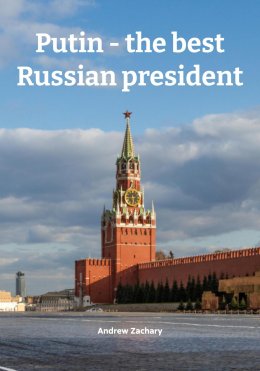Putin – the best Russian president

Introduction
The pertinence of examining V. V. Putin's role in contemporary Russian society and governance is underscored by numerous factors linked to the domestic and foreign policies of the Russian Federation. Since ascending to power in the early 2000s, Putin has crystallized as a pivotal figure in the nation’s political landscape, steering it toward a transformative trajectory, redefining the state's role and its position within the global framework.
Firstly, Putin symbolizes a new epoch in Russia, denoted by robust economic growth during his initial years in office and a formidable bolstering of Russia's stature internationally. His economic reforms, designed to enhance the efficacy of public administration and stabilize financial flows, have laid the groundwork for improved living standards and rejuvenation of the national economy. However, intense debates persist regarding the quality of these changes and their genuine contributions to sustainable development.
Secondly, the political realm has witnessed profound shifts under Putin's leadership. His governance paradigm is founded on the consolidation of authority, crucial amidst contemporary adversities and external threats. This focus has steered state policy toward reinforcing Russia’s sovereignty and autonomy while fostering a vigorous resistance to Western influence.
The primary objective of this study is to discern the reasons V. V. Putin is regarded as the preeminent president of contemporary Russia. This endeavor necessitates a thorough examination of his presidential tenure, exploring his political, economic, and social accomplishments, while critically evaluating the shortcomings and challenges encountered.
The initial task involves analyzing Putin's political actions, including his governance style, formulation and execution of pivotal political strategies, and the crucial decisions that have influenced both domestic and international policies. It is essential to assess how these decisions have bolstered state stability and shaped perceptions among various societal factions.
The subsequent task is to investigate the economic milestones achieved during his leadership. The early 2000s witnessed a notable economic revival in Russia, chiefly attributed to soaring oil and gas prices. It is imperative to analyze the structural reforms enacted in the economy, their implications for citizens' living standards, unemployment rates, and the social welfare landscape, as well as governmental responses to these changes and their significance for the sustainability of the country’s economic model.
The third task focuses on the social dimensions of Putin's governance. In what ways has his leadership influenced social programs, education, healthcare, and other critical sectors? This will provide insight into the transformation of social policy and its impact on Russian citizens' quality of life, highlighting both advancements and setbacks.
Moreover, a vital aspect of this study will involve assessing the criticisms leveled against Putin and evaluating the deficiencies of his administration. How do these elements shape the overall perception of his leadership and his role in Russian history?
